EVERYONE who has lost a parent remembers that shocked, bewildered feeling; it is impossible to convey it to those who do not know. All your life, you suddenly realise, a parental eye has been lodged inside you. It was because that eye was watching that you felt pride when you graduated.
And when you had a child of your own, you wept because you saw it all from your parent’s point of view. You wonder, now that the old one is gone, whether anything will matter quite as much.
Nelson Mandela was not literally our father — a small minority of us did so much as shake his hand. We are nonetheless children in mourning. Now that he is not looking, we wonder whether we will be the same. Will we still bother to be nice to one another? Will the poor still tolerate the rich? We worry, in fact, that a South African nation exists only because he was watching. His eyes now closed, we fear that all we have accomplished might fade and disappear. How did one man’s gaze come to conjure a nation? Where did he acquire such power? There is something quite weird about it, is there not? After all, Mandela was all too human.
We call ourselves his children, but he was not the model family man; his marriages were difficult, his fathering distracted and patchy. We call him the father of our nation, but he was not very talented at governing it. He would call upon the great and the good to build him a clinic here and school there, as if development was a matter of important men exchanging favours.
Nor was he a saint — he was hardly one to turn the other cheek.
He could be a bully and a grump. He enjoyed lashing people with his tongue.
And he acquired a special taste for wounding FW de Klerk, the very man with whom he had reconciled.
What, then, gave him the power to hold us all in his gaze? What made him the founder of our nation?
It was that he could forgive, genuinely, from his heart, without losing honour.
Forgiveness is a tricky business. It is not something one can fake. When a resentful person forgives, the price he pays is written on his face. A self-doubting person loses himself when he tries to forgive; he burns with humiliation. Mandela could really and truly forgive, without flinching, without doubting, without losing a modicum of self-respect. White people may have locked him in jail and thrown away the key, but they never came close to stealing his dignity. And so when he forgave, it cost him nothing; he forgave as a free person, not as a slave.
That was his secret. That is why he made a democratic South Africa possible. There was no way black people could both be free and share this country with whites except through forgiveness. Only forgiveness could conserve the memory of outrage and yet release people from it. Only forgiveness could refuse the right of white people the power to determine what black lives meant. Mandela showed that to forgive was to have power; to forgive was to be free.
It is hard to know whether we would ever have learnt this without him. For he did not show us by preaching or instructing.
Scour his speeches all you like, you will not find his secret there. It was in the spirit he radiated — in his demeanour, in his grace, in his magnificent smile.
These gestures, so ephemeral, so quiet, so hard to pin down, spoke much more powerfully than any words.
"I am a black man," is what he was saying. "But my skin sits lightly over my flesh. I am composed. I am in control. I am free, free enough to forgive."
Goodness knows what might have happened had he not been here. I am not sure that there was anyone else who could have fashioned a nation from the ruins of white minority rule. It was through him that we could imagine a country wide enough to encompass us all.
That is why we worry. That is why we fear that when he closed his eyes, we would begin to disappear.
But if all of this is right, we should also know that the Mandela whose absence we fear has in fact been gone a long time. For Mandela the forgiver was only with us for a brief moment — his forgiveness was the midwife of our democracy. Once that moment passed, there were other things to do, things Mandela the forgiver could not teach us. Had he not retired, had he been a decade younger and served another term, he would not be the Mandela we remember. The times would have required him to become someone else.
He would not have performed miracles. He would not have had the power to keep greed and avarice from the African National Congress. He would not have kicked our schools into shape, nor would he have gotten our cops to police better. He would not have sprung any great ideas about creating jobs. His genius lay elsewhere.
Way back, sometime in 1993, I think, I remember listening to Archbishop Emeritus Desmond Tutu talking about what it means to apologise. "If you steal my bicycle," he said. "It is not enough that you say sorry. You must give the bicycle back."
It was Mandela who made this exchange possible. It was he who showed that burning down the bicycle thief’s house was a bad idea, that one could free oneself of anger and grievance without destroying the one who had wronged you.
But Mandela had nothing to say about how the bicycle might be given back. He left that to the future. To us.
That is what we are busy with now. We have been for some time.
Anyway, really, we are not doing badly at all. If you look up from the grubbiness and the slog of day-to-day events, if you instead cast a cool eye over the past 20 years, you will see that we are doing what Mandela made possible — we are giving the bicycle back.
Just recently, the Reserve Bank released a remarkable set of figures.
Over the past two decades, real household consumption spending in South Africa has doubled. Food and utilities are taking a rapidly declining share, the most glaring sign of mass upward mobility.
Spending on recreation and entertainment has more than tripled. Clothing and footwear has jumped more than fivefold.
These are signs that masses of people are living the sorts of lives their grandparents barely imagined.
For many millions of people, life has obviously and triumphantly improved because Mandela called upon us to forgive.
Monday is the first of a nine-day period between his passing and his funeral. They will be a strange and unusual nine days.
Heaven knows, South Africans are a wild bunch, but the mourning of Mandela will not be a time for wildness.
Beginning this morning, we will feel more together than we have in a long while. Strangers will offer one another kindnesses. People who brush shoulders on the streets will feel a mutual belonging.
Many ordinary feelings will disappear; feelings that are more intense and intimate will take over.
We will find in the world around us a great deal of mutual gratitude, a great deal of measured restraint.
Together we will share in and saviour the quiet dignity he has conferred upon us all.
And we will also feel all about us a lot of pain and a lot of grief because we loved him and we are hurting.
• Steinberg teaches African Studies at Oxford University.
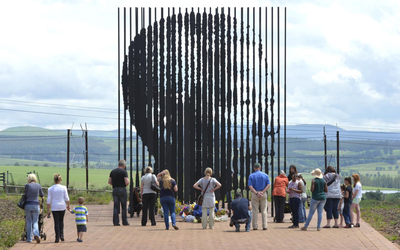
The Mandela Capture Site outside Howick, KwaZulu-Natal. Picture: REUTERS
EVERYONE who has lost a parent remembers that shocked, bewildered feeling; it is impossible to convey it to those who do not know. All your life, you suddenly realise, a parental eye has been lodged inside you. It was because that eye was watching that you felt pride when you graduated.
And when you had a child of your own, you wept because you saw it all from your parent’s point of view. You wonder, now that the old one is gone, whether anything will matter quite as much.
Nelson Mandela was not literally our father — a small minority of us did so much as shake his hand. We are nonetheless children in mourning. Now that he is not looking, we wonder whether we will be the same. Will we still bother to be nice to one another? Will the poor still tolerate the rich? We worry, in fact, that a South African nation exists only because he was watching. His eyes now closed, we fear that all we have accomplished might fade and disappear. How did one man’s gaze come to conjure a nation? Where did he acquire such power? There is something quite weird about it, is there not? After all, Mandela was all too human.
We call ourselves his children, but he was not the model family man; his marriages were difficult, his fathering distracted and patchy. We call him the father of our nation, but he was not very talented at governing it. He would call upon the great and the good to build him a clinic here and school there, as if development was a matter of important men exchanging favours.
Nor was he a saint — he was hardly one to turn the other cheek.
He could be a bully and a grump. He enjoyed lashing people with his tongue.
And he acquired a special taste for wounding FW de Klerk, the very man with whom he had reconciled.
What, then, gave him the power to hold us all in his gaze? What made him the founder of our nation?
It was that he could forgive, genuinely, from his heart, without losing honour.
Forgiveness is a tricky business. It is not something one can fake. When a resentful person forgives, the price he pays is written on his face. A self-doubting person loses himself when he tries to forgive; he burns with humiliation. Mandela could really and truly forgive, without flinching, without doubting, without losing a modicum of self-respect. White people may have locked him in jail and thrown away the key, but they never came close to stealing his dignity. And so when he forgave, it cost him nothing; he forgave as a free person, not as a slave.
That was his secret. That is why he made a democratic South Africa possible. There was no way black people could both be free and share this country with whites except through forgiveness. Only forgiveness could conserve the memory of outrage and yet release people from it. Only forgiveness could refuse the right of white people the power to determine what black lives meant. Mandela showed that to forgive was to have power; to forgive was to be free.
It is hard to know whether we would ever have learnt this without him. For he did not show us by preaching or instructing.
Scour his speeches all you like, you will not find his secret there. It was in the spirit he radiated — in his demeanour, in his grace, in his magnificent smile.
These gestures, so ephemeral, so quiet, so hard to pin down, spoke much more powerfully than any words.
"I am a black man," is what he was saying. "But my skin sits lightly over my flesh. I am composed. I am in control. I am free, free enough to forgive."
Goodness knows what might have happened had he not been here. I am not sure that there was anyone else who could have fashioned a nation from the ruins of white minority rule. It was through him that we could imagine a country wide enough to encompass us all.
That is why we worry. That is why we fear that when he closed his eyes, we would begin to disappear.
But if all of this is right, we should also know that the Mandela whose absence we fear has in fact been gone a long time. For Mandela the forgiver was only with us for a brief moment — his forgiveness was the midwife of our democracy. Once that moment passed, there were other things to do, things Mandela the forgiver could not teach us. Had he not retired, had he been a decade younger and served another term, he would not be the Mandela we remember. The times would have required him to become someone else.
He would not have performed miracles. He would not have had the power to keep greed and avarice from the African National Congress. He would not have kicked our schools into shape, nor would he have gotten our cops to police better. He would not have sprung any great ideas about creating jobs. His genius lay elsewhere.
Way back, sometime in 1993, I think, I remember listening to Archbishop Emeritus Desmond Tutu talking about what it means to apologise. "If you steal my bicycle," he said. "It is not enough that you say sorry. You must give the bicycle back."
It was Mandela who made this exchange possible. It was he who showed that burning down the bicycle thief’s house was a bad idea, that one could free oneself of anger and grievance without destroying the one who had wronged you.
But Mandela had nothing to say about how the bicycle might be given back. He left that to the future. To us.
That is what we are busy with now. We have been for some time.
Anyway, really, we are not doing badly at all. If you look up from the grubbiness and the slog of day-to-day events, if you instead cast a cool eye over the past 20 years, you will see that we are doing what Mandela made possible — we are giving the bicycle back.
Just recently, the Reserve Bank released a remarkable set of figures.
Over the past two decades, real household consumption spending in South Africa has doubled. Food and utilities are taking a rapidly declining share, the most glaring sign of mass upward mobility.
Spending on recreation and entertainment has more than tripled. Clothing and footwear has jumped more than fivefold.
These are signs that masses of people are living the sorts of lives their grandparents barely imagined.
For many millions of people, life has obviously and triumphantly improved because Mandela called upon us to forgive.
Monday is the first of a nine-day period between his passing and his funeral. They will be a strange and unusual nine days.
Heaven knows, South Africans are a wild bunch, but the mourning of Mandela will not be a time for wildness.
Beginning this morning, we will feel more together than we have in a long while. Strangers will offer one another kindnesses. People who brush shoulders on the streets will feel a mutual belonging.
Many ordinary feelings will disappear; feelings that are more intense and intimate will take over.
We will find in the world around us a great deal of mutual gratitude, a great deal of measured restraint.
Together we will share in and saviour the quiet dignity he has conferred upon us all.
And we will also feel all about us a lot of pain and a lot of grief because we loved him and we are hurting.
• Steinberg teaches African Studies at Oxford University.


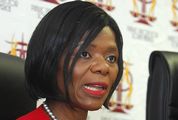
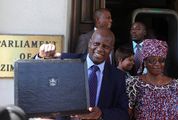

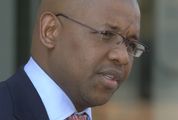


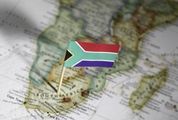

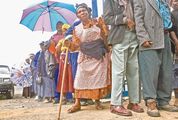
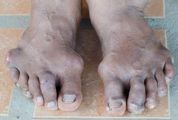


 News and views on the death, and life, of former president Nelson Mandela, with tributes and photographs
News and views on the death, and life, of former president Nelson Mandela, with tributes and photographs





